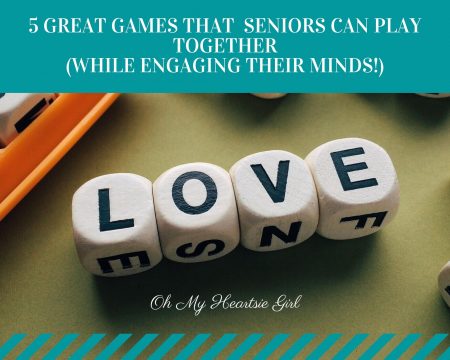
Playing games with your elderly loved ones is not only a great way to bond, spend time together, promote inter-generational fun whilst helping stimulate their mind. Games can provide a fun and subtle avenue for improving seniors’ memory and helping to keep them mentally active, alert, and engaged. Researchers have proved that seniors who are regularly stimulating their mind by exercising their brains on a regular basis and challenge themselves to try new things score markedly higher on cognitive testing. So if you’re looking for a way to bond with an older person in your life, while helping to sharpen their memory, give these games a try,even online with their laptop
- Scrabble
More than just being fun, word games are an excellent tool that sharpens the mind and forces you to think laterally. provides food for mind sharpening. Playing word games such as Scrabble or Boggle, for example, promotes creativity, improves memory, critical thinking, and problem-solving. It also loved across generations and can be played by anyone, from a school-aged child learning to spell to a grandparent. Check out large tile versions of Scrabble which are perfectly designed for aging eyes. Have family fun while combating the early stages of dementia, however – make sure you remember that in the later stages of dementia these sorts of games could be too challenging and cause stress.
- Card Games
Card games are an excellent way for seniors to enjoy each other’s company. The versatility of card games creates an environment in which seniors can think on the fly, develop a strategy, and reminisce about their childhoods. There are so many games that can be played using a single deck of cards from poker to bridge to their favourite games from childhood. Many seniors grew up playing card games and the nostalgia that comes from a deck of cards is undeniable. There are so many games that you can play poker, bridge, blackjack, rummy, hearts – the list goes on. Card games like these promote focusing, memory, and some healthy friendly competition!
- Chess
Chess is a great game is perfect for younger or mentally active seniors. The fact that it is a two-player game promotes companionship keeping the players both engaged not only in the game but in conversation as well. The fun part is that, even if seniors have been playing this game their whole lives, you can never stop learning. It is always a challenge! Chess is a problem-solving, strategy game with straightforward rules that involve forward-thinking and spatial awareness. In fact, researchers have confirmed its positive impact on our brains. It has been proven that there is a link between playing chess and a lower chance of developing dementia and Alzheimer’s. Scientists say that seniors over the age of 75, who regularly played chess, did not show signs of developing dementia until well after their peers who hadn’t played the game. Similarly to Scrabble, there are large-scale chess boards and pieces that are perfect for aging eyes.
- Bingo
Bingo is an easy but entertaining activity that is popular with seniors the world over. This game is great for promoting sensory engagement. When the numbers are called out seniors must listen attentively, then use their sight to scan their cards for the number – observing and memorising their own cards and then using their fine motor skills to physically mark off the numbers. Though the true benefit of this game is that, above all else, it is an exceptional social activity, which can help fight the epidemic that is geriatric loneliness and depression.
For residents who reside in aged-care homes such as Kew Gardens, Bingo is a common and much loved social activity. Easy to organise and to set up, it can be played in any care home or family home for that matter. Stimulate your senses and spice things up with a bit of healthy competition between peers – Bingo is a great way to engage older people in games and activities.
- Pictionary
Pictionary is a popular drawing game that can be played by any age group and is perfect for inter-generational fun. Players can choose their teams and then must cooperate, work together and extrapolate guesses based on each other’s drawings. Regardless of your ability to draw, the game can be fun, in fact, sometimes the worse the drawing is, the more fun there is to be had. Though, keep in mind is that this game might not be the best choice for seniors with shaky hands or those who have arthritis.
Keeping the mind active, exercising the memory and sharpening the brain is as crucial for anyone looking to fight the signs of aging or dementia. Not only do these games keep seniors mentally challenged and stimulated but, they promote togetherness and companionship which is equally important when it comes to fighting loneliness and geriatric depression. These games are fun, simple, promote team-work and strategic thinking and can be played in aged-care homes or family homes.
[…]
Retire Young – 3 Steps You Can Take Today To Set Yourself Up For Early Retirement
Stop The Aging: Keep Muscles and Brain Healthy
5 Surprising Factors That Accelerate Skin Aging
This post may contain automatically and manually added affiliate links, which means I might receive a small commission if you make a purchase using a link at no extra cost to you.


 If you’re a parent of a child who has learning or attention issues, it’s going to be important for you to know whether they’re eligible to receive what is known as ‘Special Education’. This is where your child will receive extra classes, mentors, resources or services that can help them achieve to the best of their abilities.
If you’re a parent of a child who has learning or attention issues, it’s going to be important for you to know whether they’re eligible to receive what is known as ‘Special Education’. This is where your child will receive extra classes, mentors, resources or services that can help them achieve to the best of their abilities. BetterHelp – online counseling which has helped millions
BetterHelp – online counseling which has helped millions